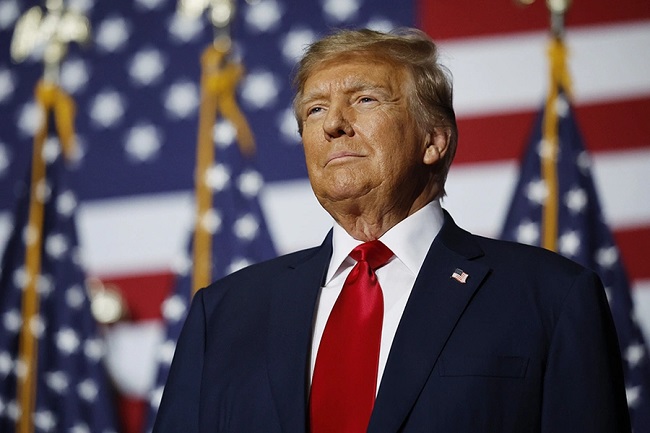There are indications that the victory of Donald Trump in the United States presidential election could have significant implications for Nigeria’s financial system and external economic position says the Managing Director/Chief Executive Officer, Financial Derivatives Company (FDC) Limited Mr. Bismarck Rewane.
In his recently released Lagos Business School (LBS) Executive Breakfast Presentation for November, Rewane and his team stated that with the Economist Intelligence Unit (EIU) projecting that a Trump win may strengthen the U.S. dollar and lead to higher interest rates, Nigeria faces the possibility of rising costs for external borrowing and debt servicing.
As the naira weakens against a stronger dollar, Nigeria’s already substantial external debt obligations, estimated at $112.3 billion, could become more challenging to manage.
“For Nigeria and other developing economies, the impact is four-dimensional immigration, climate change, trade, and geopolitical. Nigeria has been non-aligned in geopolitical terms, it has not benefited immensely from trade flows but has gained from international banking credit. On immigration, Nigeria’s diaspora has been a source of workers’ remittances which peaked at approximately $24 billion a few years back.
“Therefore, the big lesson here is that the emphasis should be on a resilient domestic economy. Failure to do so will reinforce the stereotypes of a sh*tthole country where young people are emigrating in droves and remitting cashback. The Japa syndrome will become a reverse migration. For Nigerian leaders, this is a wake-up call for economic reinvigoration.
“The key issues that need urgent attention, most notably, is the exchange rate determination mechanism. There is no economic justification for the naira to be trading at less than 30% of its fair value in less than twelve months. We strongly believe that the naira will recover some of its losses in January 2025 for four simple reasons: (a) The differential between the parallel market and the official market rate has virtually disappeared. This was responsible for a minimum of 30% of the value erosion due to speculative roundtripping (b) The supply of dollars into the market, which is a function of oil production and prices. (c) The CBN should and we believe will announce a programme of dollar sales to the market similar to the T/Bill auction. This will help reduce market uncertainty, “ the firm stated.
With the victory of Donald Trump in the U.S. presidential election, analysts at the Economist Intelligence Unit (EIU) predict significant economic repercussions for Nigeria’s external position.Key projections include a strengthening U.S. dollar, higher interest rates, and increased borrowing costs, which could have far-reaching consequences for Nigeria’s financial landscape.
A Trump win, the EIU suggests, would likely drive up the value of the dollar and push U.S. interest rates higher. This shift could prove challenging for Nigeria, where a stronger dollar would increase the effective cost of external borrowing, impacting both public and private sectors.
Currently, Nigeria’s total external debt obligation stands at an estimated $112.3 billion, a considerable amount that would become even more expensive to service under these conditions according to FDC Limited.
Higher interest rates could also strain Nigeria’s budget by raising debt servicing costs. For a country already grappling with fiscal pressures, this could intensify the burden on the naira, potentially leading to further depreciation of the currency.
Given that Nigeria’s oil revenue—the primary foreign exchange earner—is declining in dollar terms, this pressure could compel Nigeria to rely even more on external borrowing to meet its financial commitments.
In addition to financial pressures, Trump’s anticipated trade policies according to analysts, could heighten challenges for Nigeria’s trade relations. The EIU forecasts a likelihood of increased trade barriers under Trump’s administration, potentially complicating trade between Nigeria and the United States. Although this might lead to more stringent conditions for Nigeria’s exports, a positive relationship may also present opportunities in some sectors.
Over the last few decades, global trade has expanded, doubling from 25 percent of global GDP in 1980 to 56 percent today.
However, Nigeria’s share has taken a different trajectory, declining steadily from nearly 1 percent in 1980 to a mere 0.18 percent in 2023. This decline, driven largely by weak exports—down by 44 percent compared to 2011—underlines the country’s struggle to diversify and expand its export base.
“If trade relations with the U.S. become more restrictive under Trump, this trend could continue, posing challenges to Nigeria’s economic resilience, “ the FDC team predicted.
Also, Nigeria’s stance of nonalignment in international conflicts—such as those in Ukraine, Gaza, and Lebanon—may influence its trade relations indirectly. The potential for stricter U.S. trade policies could impact countries that maintain neutrality on certain geopolitical issues, though the specific implications for Nigeria remain unclear.
As Nigeria navigates the potential fallout from a Trump victory, policymakers will likely need to bolster strategies to manage external borrowing costs, stabilize the naira, and diversify the nation’s economic portfolio. The prospect of increased debt servicing costs and weakened trade ties with the U.S. underscores the importance of long-term fiscal sustainability and strategic international alliances.
READ ALSO: Bode George to Sanwo-Olu: Regulate street trading, don’t treat traders like criminals
Get real-time news updates from Tribune Online! Follow us on WhatsApp for breaking news, exclusive stories and interviews, and much more.
Join our WhatsApp Channel now
